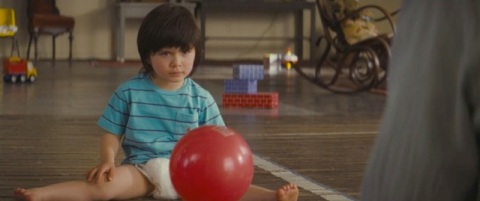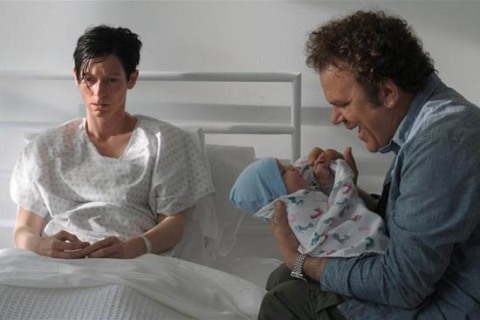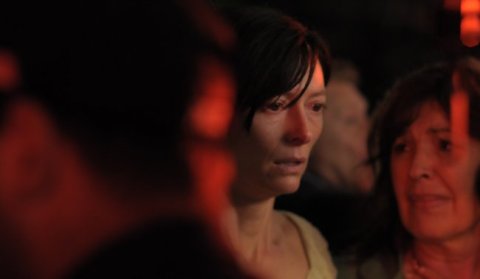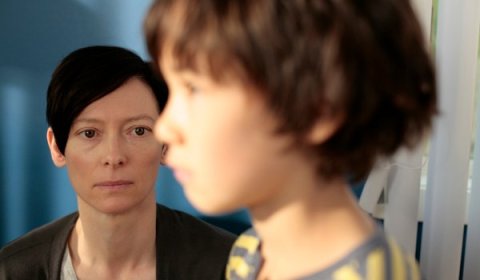We’ve all seen it before: the 2-yr-old is standing in the middle of the room screaming his head off. His face is red, his hands balled into comical little fists. His mother and I stare at him with a kind of exhausted paralysis. She looks at me and says flatly (and funnily), “Oh, the maternal ambivalence.” This takes place years before either of us was aware of We Need to Talk About Kevin, either book or film. Now I wish I’d seen the film with her — I can’t imagine how interesting our post-viewing debriefing could have been, how much more I could have learned from that conversation.
 “Maternal ambivalence” isn’t just the right statement in a situation like when your kid has one of those histrionic meltdowns; it’s the only one to mitigate the maternal sense of failure and the simultaneous balking at calling it “failure.” If your kid behaves horribly, impossibly, inconsolably, how do you as his mother evade the sense that you ought to apologize for his awfulness, as if it’s your fault? How do you know it’s not your fault — in fact, isn’t it sort of your fault? How do you stop feeling implicated in the mini-psychodramas of a 2-yr-old – who, frankly, is probably going to act out no matter what you do? How do you help but feel that when they’re in this state, a 2-yr-old is often a kind of little animal with no reason and certainly no manners, and therefore out of your control?
“Maternal ambivalence” isn’t just the right statement in a situation like when your kid has one of those histrionic meltdowns; it’s the only one to mitigate the maternal sense of failure and the simultaneous balking at calling it “failure.” If your kid behaves horribly, impossibly, inconsolably, how do you as his mother evade the sense that you ought to apologize for his awfulness, as if it’s your fault? How do you know it’s not your fault — in fact, isn’t it sort of your fault? How do you stop feeling implicated in the mini-psychodramas of a 2-yr-old – who, frankly, is probably going to act out no matter what you do? How do you help but feel that when they’re in this state, a 2-yr-old is often a kind of little animal with no reason and certainly no manners, and therefore out of your control?
I’m hardly the first to notice that ours is a particularly hysterical culture when it comes to blaming mothers, mothers blaming themselves. I’d go so far as to say that ambivalence is a healthy response to the schizophrenic messages about what motherhood is supposed to be. With that in mind, however, let me say: We Need to Talk About Kevin is not for the faint of heart.
What you realize while watching Lynne Ramsay’s film is that we never seen representations of mothers who feel riddled by ambivalence. Dads? Sure. As bracing as Louis C. K.’s humor about being a bad parent can be, it’s popular, socially acceptable, hilarious. Mothers don’t get the same leeway. Moms are supposed to be happy, well-adjusted, delighted with their children. Pregnancy is supposed to make women glow. Motherhood, we hear all the time, is supposed to draw out women’s “natural” self-sacrificing tendencies. Good mothers, we learn, raise good children.
But then there are those dark exceptions. What about that mother who drowned all her children? Whose fault is it if your kid is a bully or a mean girl? Worst of all: when a kid kills fellow students in a school shooting rampage, who do you blame? These are some of the dark questions We Need to Talk About Kevin explores.
Eva (Tilda Swinton) wasn’t always so ambivalent. As a travel writer, she can remember some pretty transformative, ecstatic experiences; she’s not given to depression. There was that one time when she crowd surfed during that tomato festival, when she and everyone else was drenched in smashed tomatoes. You have to look carefully at first to see whether she’s hysterical or elated.
She experienced sex that night with the same giddy elation. Franklin (John C. Reilly) asked if she was sure she wanted to go without the condom — and she said yes, she was sure. For a moment there, she wants to be pregnant and knows perfectly well that their drunken, happy sex might get her there.
The actual experience of pregnancy is something else again. All those other blissful and very pregnant women stretch and happily rub their enormous bellies in the locker room of the Y after that prenatal yoga class, while Eva looks glum. She walks out of the gym amidst a stream of giddy six-yr-old ballet students and is unmoved by their pink tutued effervescence.
It doesn’t change after the birth. She doesn’t want to be this way — she just is. Even worse, he’s a colicky baby, screaming constantly. It’s even worse when she realizes that the baby quiets down the minute Franklin gets home, confirming his belief that Eva has over-reacted to the baby’s fussiness. All of this makes her feel guiltier. She’s a bad mother for not liking that baby more … but his screaming makes it all the harder. Even a jackhammer is preferable to that scream.
Look at Franklin with his son. He’s delighted. He functions as the quintessential, bright-sided American optimist. Everything’s great! And the baby responds in kind: Franklin’s presence is a balm to little Kevin. Every time his father appears, Kevin transforms into a different child.
What’s wrong with her? Is she responsible for his awful aggression? Yet she can’t help but think there’s something wrong with this child — really wrong. And when she says “something wrong,” she invokes that little kernel of anxiety that keeps you wide awake, heart pounding, at 3am with worry about what that something might be. She takes the toddler to the doctor, who gives him an unequivocal thumbs up. Whew — right?

The film ultimately makes a surprising move. Seen through Eva’s eyes, we have no doubt that Kevin is a sociopath — a brilliant, manipulative, unfeeling monster. But the film doesn’t let Eva off the hook (just as she never lets herself off). Nor is this a self-flagellating move. The film does something amazing, disturbing, revelatory: it shows that although she may not be responsible for Kevin’s psychosis, the crazy intimate antagonistic fucked-upness of their mother-son relationship is, in fact, at the very center of Kevin’s choices about acting out. Insofar as he wants, above all else, to keep her engaged with him — to provoke her out of her maternal ambivalence and malaise — she is, in fact, partly responsible, and she will never get over it.

In addition to offering us this creepy, awful realization, however, Lynne Ramsay’s film is a sustained critique of the crazy cultural contradictions we hurl at mothers all the time. Those reality shows filled with problematic children and terrible parenting — parents who cede authority to a stranger who shames them on network TV. State laws that not only permit potential employers to ask women whether they’re mothers, but which view motherhood as a “problem” for a woman doing the job (mothers are disproportionately discriminated against in hiring and promotions, and pay a “mommy penalty” in lower wages for the rest of their careers). Draconian new laws designed to criminalize “bad” mothers even when the science of such determinations is sketchy at best — these are just tips of the iceberg of schizophrenic ways that American mothers are simultaneously put on pedestals and punished. Google “mommy wars” and you’ll find infinitely more chaos.
Early on in the film Eva walks out of a job interview, feeling uncharacteristically good. As she approaches a couple of very well-heeled middle-aged women she knows, she begins to smile to greet them. One of them reaches up and smacks Eva, hard, across the face.
A man rushes up behind the stunned Eva to help, to call the cops, to do something. “No, no, no … it was my fault,” she assures him. At first this seems like the craziest, most masochistic statement you can imagine.
The thing is: she really believes it. And our culture put her there. This utterly memorable, haunting, scathing film will not let you believe those questions about nature vs. nurture, innocence vs. guilt, or good mothers vs. demon mothers are simple ones. You’ll leave this film feeling like you’ve been smacked, too.
And yet there’s something about the ending that feels … do I dare say it feels like a change in the air? Not revelation, not transformation, but something new. Please watch We Need to Talk About Kevin and tell me what you think. I for one can’t stop thinking about it.
What’s wrong with Kagan, Mom edition
19 May 2010
I really hoped this one would go away, but of course Lisa Belkin had to join in with a New York Times Magazine piece this week, which in turn seemed to cue Maureen Dowd, who was already all over the gay question. Sometimes it just makes my head hurt really bad.
If we pay attention to the news, there’s lots of things wrong with Elena Kagan, and the media is looking for more every day. So imagine their delight when some journalists started suggesting it’s her lack of children. It’s the perfect argument, for it seems to have no clear partisan, anti-Semitic, or homophobic bent (like most of the others), AND we get to trash her life choices! Anti-feminism activated!
It started with Peter Beinart at the Daily Beast explaining there are two reasons we should appoint women to the Supreme Court (oh, the desire to call this mansplaining): 1) “female justices, on average, will be more sensitive to the problems women face” and possibly those faced by other disadvantaged groups; and 2) they can help alleviate gender bias by being role models. Is that it? I wonder why we need so darn many if those are the only reasons.
His main point was to note that a majority of the women appointed to cabinet positions during the last three presidential administrations were childless; only six of the sixteen women in those positions have had children. If Kagan is appointed, only two of the four female Supreme Court justices in American history will have been mothers — and that’s just not fair.
There’s nothing wrong, of course, with appointing childless women (or men, for that matter) to high office. But our government is actually doing a pretty good job of providing role models for the 20 percent of American women who don’t want kids. Where it’s failing is in providing role models for the 80 percent that do.
If we want to talk about “failing,” maybe it would help if we remember that of the 111 justices in US history, 106 have been white men, 2 African American, 2 white women, and 1 Latina. Maybe it would help if we had more than 4 women in Obama’s 15-person cabinet. Maybe it would help if people like Beinart, Belkin, and others remembered that simply having more women in positions of power is inspiring to women; not everyone asks first & foremost whether a woman is a mother. A quick note: only 4 of the Supreme Court justices in American history were bachelors, and I can’t find any information on how many were fathers. But we do know that all of the men currently sitting on the Court are fathers. (And look how that’s worked out, sensitivity-wise. Apparently women have special feeling powers!) To complain that Kagan isn’t a mother is to draw attention away from the fact that even now, the Supreme Court really looks nothing like the rest of America. Yes, more women on the Court is a small step in the right direction for women; but let’s not be reductionist about the complicated issues presidents weigh as they make their choices. Obama may have wanted to find a woman this time, but that probably wasn’t the only thing on his mind.
Beinart argues that Obama should have chosen mom Diane Wood instead, and although he probably wouldn’t go as far as Hilary Shenfeld at iVillage that Wood would have brought “some unique ‘mom-spertise’ to the Supreme Court,” he probably should have guessed that this was whither his argument was tending:
With the addition of Wood, a jurist with a mama bear lurking inside, the Supreme Court would have a member who’s lived through the toughest job on earth and came out better for it. She’s wiped away dirt and tears, helped with homework and heartache, made as many decisions as dinners, really listened and really heard. She’s had years of experience settling squabbles and determining who’s right and who’s wrong. She would have come to the job not only with legal smarts, but also the real-world wisdom picked up from the day-in, day-out joys, frustrations and plain hard work of being a mother and raising a family.
Um, what are we talking about again? Oh yeah, whether we should appoint mothers to the court because then the Court will look more like America and inspire women to be mothers and jurists. Lisa Belkin in the New York Times quotes Shenfeld, but avoids the maudlin in order to reiterate Beinart’s argument: we’re sending the wrong message to women by appointing so many childless women to positions of high power. Women learn from these choices that bearing children is risky for career-minded women:
Expectation brings obligation, and Sotomayór and Kagan were of the generation facing new tradeoffs. Pursue the career and sacrifice the family. Have the family and ratchet back the career. True, the stigma of not marrying or having children waned for this younger generation, making it more of a deliberate choice for some. But still, roads had to be chosen. There would be no taking five years off to stay home with your children if you hoped for a seat on the Supreme Court.
That’s just how we childless women operate, you see. We sit down when we’re 10 years old and “choose” to study and work so hard that we will have no lives, ever, because we’re plotting out our paths to seats on the Supreme Court; the people we’ve got to knock out of our way are those super-feeling mommies. When Belkin lays out these “new tradeoffs,” she makes enormous assumptions not just about Sotomayór’s and Kagan’s “choices” (not everyone “chooses” to be childless, stay unmarried, or get divorced, as in Sotomayór’s case), but also about what most Americans admire about female leaders. (And excuse me, but who exactly gets to choose to take “five years off to stay home with your children,” anyway?) This, of course, led to Maureen Dowd’s piece today on the difference between being “single” and “unmarried.”
But my real gripe here is the constant parsing the lives of exceptional women for details that are irrelevant to their nomination — thereby permitting, yet again, women to be treated differently than male candidates for the same job. She’s the wrong kind of woman, these comments tell us. Some women make the wrong kinds of choices, they imply; we should feel sorry for her because she’s unmarried and childless. And it allows everyone to get distracted by the illusion that this is a zero-sum game in which women are fighting it out amongst themselves.
Goldman Sachs says thanks, Double X!
25 March 2010
Why does Slate’s XX Factor exist? Initially the site told us it was “A Magazine By Women, But Not Just For Women” (the language of which is exasperating enough), and now it’s “What Women Really Think.” Personally, I can only read it if I hold my nose. Although its writers take on questions of interest to women, they most often embrace a shocking anti-feminism — appearing to assume on the one hand that women are fully equal to men, and dismissing with the other hand feminists who think otherwise.
Take, for example, this post by K.J. Dell’Antonia that might as well be a big gift to so many corporations, law firms, and universities who treat their female employees as second-class citizens if they dare seek a reduced work schedule in order to bear and raise children. Dell’Antonia writes about the female Goldman Sachs executive who was offered a “mommy track” to reduce her hours while she adopted the primary caregiving responsibilities in her family; when she wanted to return to her full-time job, she was then told by Goldman that her position had been eliminated. Suck it up, Dell’Antonia advises — Goldman can only be expected to be compliant up to a point.
That’s right, women: we are exactly the same as men, and are so fully equal to them in all respects that our requests for “special treatment” like serving as primary caregivers are abhorrent, full stop. You’re in or you’re out, moms! Employers must have their rights protected, even when they giveth a part-time job with one hand, and then with the other taketh the entire job away when it’s less convenient.
Now, I’m not saying that questions about the mommy track are simple. In fact, the question of motherhood and involvement in the workplace have been percolating for years, punctuated by the New York Times Magazine‘s famous “Opt-Out Revolution” article by Lisa Belkin and the terrific response by Susan Douglas, first in In These Times and then her book, The Mommy Myth.
But no matter how contentious these questions remain, I can assure Double X that taking Goldman Sachs’ perspective is not “what women really think.” But Goldman sends you a big kiss anyway.








